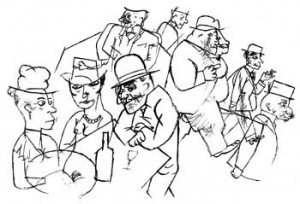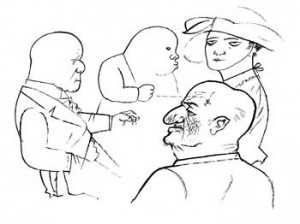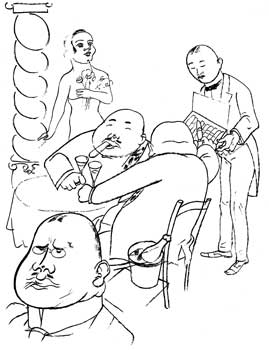 Reproductions from the book Ecce homo, by George Grosz
Reproductions from the book Ecce homo, by George GroszAfter all, the authors observe, from the point of view of the citizen, the country is facing a dilemma when it fights corruption: the more it is fought, the more it makes the headlines, and the more it makes the headlines, the more it is perceived. “From the point of view of the citizen, fighting corruption generates the appearance of its greater presence in the administrative life of Brazil.” The danger is of forever seeing a “sea of mud” in the life of the nation. Another danger is to see this sea only in Brazil. “The tautological explanation that Brazil is corrupt because of its identity almost dispenses with reflecting theoretically upon and empirically studying the phenomenon of corruption. Despite the apparent criticism, this is nothing more than a way of resigning oneself to its reality. From this viewpoint, the country is inevitably and definitively corrupt, due to certain values and practices which, present right from the outset, have become part of its character. This explanation, in addition to being biased, reduces history to its essence and simplifies it by attributing an explanatory overload on culture to the detriment of its varied links with other dimensions of social life,” is the way the organizers analyze it. “Today, the organization Transparency International guarantees that in all countries surveyed there is not one that can record the absence of the phenomenon of corruption. Rich countries, such as the USA, France, Germany or Argentina, appear on the lists in which bribery is seen as routine; bribery is the most widespread form of corruption in the world – it is a two-way practice: countries suffer internally, but they also promote it externally in their business dealings with other countries,” recalls the political scientist from the Federal University of Minas Gerais (UFMG), Wanderley Guilherme dos Santos.
 Reproductions from the book Ecce homo, by George Grosz
Reproductions from the book Ecce homo, by George GroszThere are other ways of understanding this phenomenon. “Alessandro Sartori says that every political decision produces external risks that affect those obliged to live with a decision in which they did not participate: the risk of tyranny, incompetence and corruption. Thus, corruption is one of the external risks that may negatively affect the operation and results of political systems. However, if there is corruption, then let there be scandals, because publicizing corruption is a sign of the robustness, not the weakness of the political system,” observes political scientist Fátima Anastasia from UFMG. And in Brazil how is this movement observed? “Brazilian corruption is old and mutant: today’s corruption is not the same as it was 100 years ago, or rather, national corruption has changed direction. The accusations of corruption directed against the Empire and the First Republic referred not to people, but mainly to the system. Dom Pedro II was not called corrupt because he presided over a corrupt administration, or in 1930, when the revolutionaries called the politicians of the Old Republic rotten they did not mean they were thieves. It was the systems that were corrupt because they did not promote the commonwealth,” explains historian José Murilo de Carvalho. Starting in 1945 there was a semantic change in the accusation of corruption. “The opposition to Vargas, headed by politicians from the UDN, turned their guns against individual corruption, against the lack of morality of people. In this key, it was individuals who were corrupt, because they stole public money for self-enrichment and for enriching their friends. A similar posture presided over the justification for the coup of 1964, carried out, so it is alleged, against subversive and corrupt people,” he recalls. The current discourse is heir to this UDN-follower discourse, which is present today in the outcry against mensaleiros [opposition politicians receiving money from the Government in return for supporting it] and other predators on the res publica, remembers the historian. At the end of the Sarney government, Collor’s war cry, which took him to the Presidency, was also to hunt down people, the “maharajahs.”
However, in the current debate about corruption, a systemic ingredient of an ideological character is also present, which is analogous with the Empire and the First Republic. The most lucid reaction to corruption involves not only individual behavior but also frames it within a systemic political, not moralistic perspective. “According to these views, corruption is unacceptable because it undermines the very essence of the democratic-representative system, in its search for good government as a correct, efficient and honest management of the commonwealth,” notes José Murilo. “For others, this criticism is merely “Udenism” and the vision of a good government is an instrument for promoting equality, without being concerned about the correctness of the means adopted.”
The ethical danger that arises from this is latent, but intense. “That’s why politicians from the Left seem to feel hard done by when those who voted for them manifest more indignation at news of corruption in their parties than when faced with the corruption of the conservatives. There is no reason to be amazed. Great disappointments are directly proportional to great hopes,” observes psychoanalyst Maria Rita Kehl. “When it is revealed that a politician elected on the back of a commitment to popular interests acted in his own interest, society becomes bewildered, there is a break in the symbolic field and indignation in the symbolic field may rapidly descend into cynical authorization for a generalized lack of ethics at all levels: “or morality is restored?,” assesses Maria Rita. If those who govern, who occupy the symbolic place of the father, put themselves above the law, violence tends to spread throughout the whole of society. “In Brazil, in 2005, the “crisis of the mensalão”[scandal involving allegations of the Government bribing opposition politicians] aroused feelings of disillusionment and revolt against the Labor Party administration that were more dramatic than against other parties that had shown themselves to be corrupt, since the Labor Party had been elected under the banner of transparency,” she analyses. According to the researcher it is understandable that when a government elected in the name of hope and transformation reveals itself to be like the others, cynicism follows the initial disappointment and perplexity, and political action is demoralized. That is when resentment is born?
 Reproductions from the book Ecce homo, by George Grosz
Reproductions from the book Ecce homo, by George Grosz“For a long time there was in Brazil resistance among the ruling segments of society in admitting a domination model based on equal opportunities and conditions, thus rejecting any possibility of social change. This was a determinant for the appearance of the figure of the rogue. Used to governing unconditionally, despots will not recognize themselves as being part of the modern regulatory and classificatory model, finding it difficult to assimilate the notion of rights and equality,” observes the researcher. This, he continues, discourages the lower classes from accepting these imperatives and so tradition defeats modernity. “In this sense, the despots were transformed and transformed the individuals they kept under their control into rogues, because roguishness is nothing other than a phenomenon that refuses to recognize the legitimacy of the modern order, trying to act outside its institutions, albeit in a type of dialectic of order and disorder. What will be reproduced for many a year will be a human mass that seems to want to avoid modern rationality as often as it can. By being prevented from competing on an equal footing since they were born, individuals are led to believe that there is always a “jeitinho” for bending the rigidity of the social hierarchy and for obtaining some advantage, thereby coming out on top,” analyzes the researcher. This is where the roguish habitus starts becoming valid for the most varied of social segments, an unceasing search for a differential cultural capital that authorizes all social classes to use their deceitful cunning whenever necessary. It is for no other reason that the middle classes themselves, which are generally moralistic, will use the resources of roguishness whenever they are indispensable. The response, like that of the corrupt politician, is always the same: “This is what ends up dictating the general pace to morally-challenged individuals living on the periphery of the modern world, and that only a radical shock of citizenship will put to flight.”
Republish